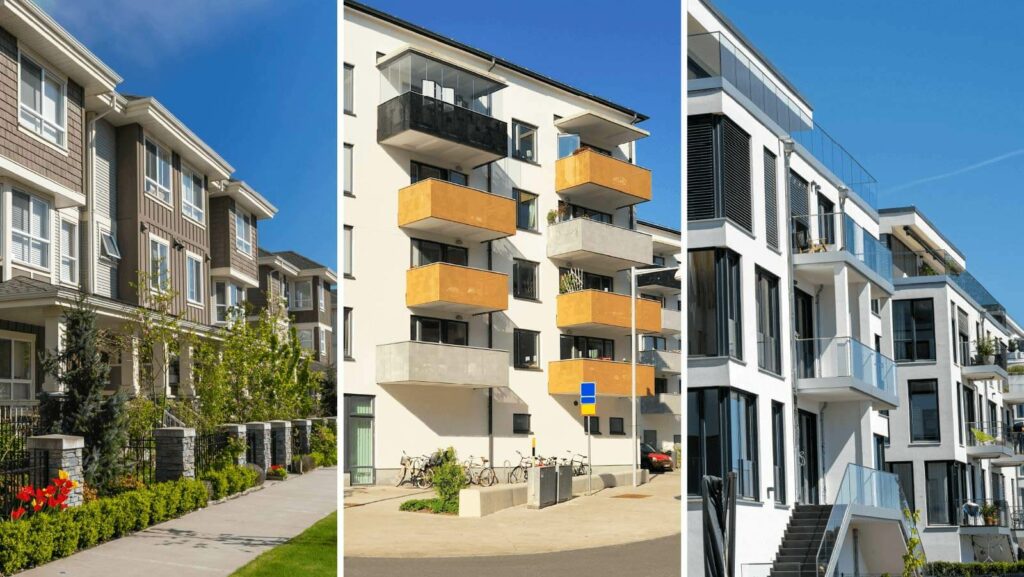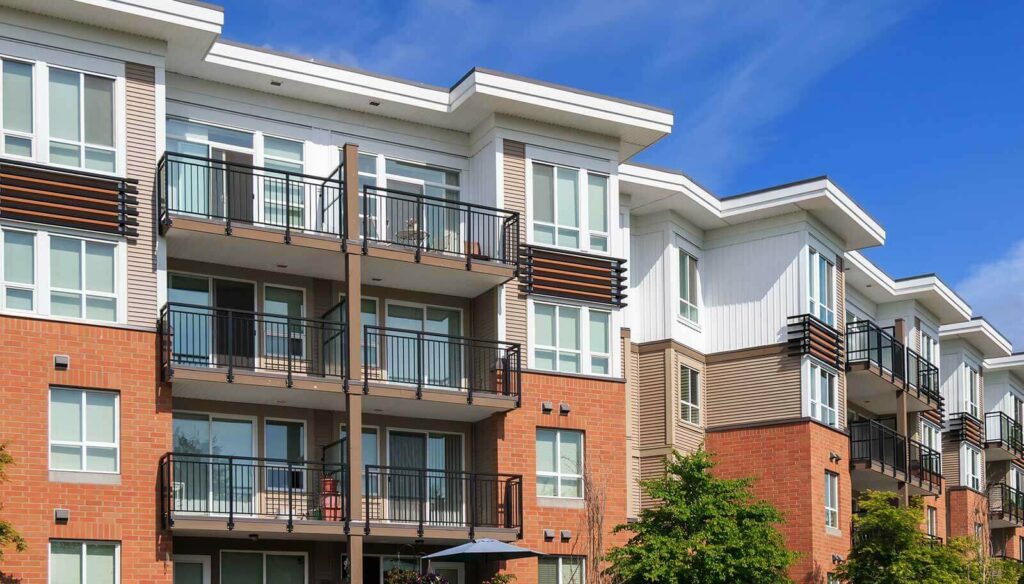Condo vs. Apartment: Which Is Best for You?
Ownership isn’t the only difference between the two scenarios.

Ownership isn’t the only difference between the two scenarios.

Not sure whether to buy a condo or rent an apartment? It’s a major life decision, but it doesn’t have to be stressful.
Okay, it might be a little stressful. After all, we’re talking about either taking the leap into home ownership (with all the responsibilities that entails), or continuing to pay a monthly fee to a landlord (without building your own equity).
This article will help you evaluate both options, and decide which is the best fit for your lifestyle—and bank account.
A condominium, or condo, is an individually owned unit inside a residential building or complex.
While you are responsible for what goes on inside your own unit, you’ll also have to pay a homeowners association (HOA) fee, and abide by certain rules that the HOA sets.
That monthly or annual fee goes toward maintenance costs for the building’s exterior and common areas, as well as repairs, landscaping, and amenities. That means things like the elevator, or the nicely manicured communal roof deck. (Your complex’s condo association insurance policy will cover damages to these common areas, as well as potential liability issues in those areas.)
If you own a condo, it’s possible that you’d be allowed to sublet it.
There’s obviously no single definition for an “apartment,” since they come in infinite shapes and sizes. Some newly renovated apartments might be full of gleaming appliances; others may not have gotten sufficient TLC since 1978.
For the purposes of this article, we’re mainly focusing on higher-end apartment units, often casually referred to as luxury apartments (although the degree of luxury may vary wildly). These apartments are generally owned by an individual landlord or by a property management company that manages the overall building. In an apartment building, units typically look similar, but can vary in size, design, and layout.
If you live in an apartment complex, you’ll owe a monthly rent payment that covers maintenance, repairs, amenities, and the apartment itself. In some apartments, rent will also cover parking, water, trash, and sewage.
Apartment tenants report either to a landlord or to a property manager within a leasing office and must abide by community guidelines.

The main differences between condos and apartments relate to ownership and property size. However, there are a few other key distinctions between these types of homes.
When you purchase a condo, it’s similar to purchasing a standalone house. But there are certain factors to keep in mind. A condo building will generally contain multiple condos, each of which has its own owner. Meanwhile, the HOA is responsible for building fees and exterior upkeep.
What if you own your condo, but want to temporarily rent it out? A condominium owner can typically put their unit up for rent and will then serve as the acting landlord. Your subletters will still have to abide by the HOA rules even though they do not own the physical unit.
Apartment buildings, on the other hand, have only one sole owner: a property management company or an individual landlord. Residents cannot purchase units separately, and each unit has a different renter.
In many cases, a corporation purchases the apartment building and then hires a management team to handle the day-to-day operations. Apartment renters may never meet the actual apartment owner; instead, all inquiries would go through the property management team.
One of the biggest differences between condos vs. apartments? Price.
Unsurprisingly, condos are more expensive upfront than apartments. After all, you’re actually purchasing the property. And with the volatile real estate market in 2022, condo prices might suddenly be out of your price range, depending on where you live.
Condo owners typically make a down payment on the property followed by monthly mortgage payments. Unlike renters, condominium owners are building equity throughout their ownership period. Equity is the difference between your mortgage and your home’s current value.
Meanwhile, if you’re only renting an apartment or condo, you are living there for a limited period of time that is dictated by your lease. Unlike condo owners, renters do not have to worry about maintenance fees or added costs… but your monthly payment is going straight to the property management and you are not building equity. If you live in the same apartment for two decades you’d end up no closer to “owning” anything than when you began.
Maintenance issues pop up when you least expect them. Whether it’s an overflowing toilet, an AC unit on the fritz, or even the dreaded scourge of bed bugs, someone is in charge of fixing the problem… but who?
If you own a condo, guess what? Maintenance is your responsibility. Keep in mind that this might mean more out-of-pocket expenses if the issue is inside your condo unit. The homeowners association usually handles condo complex maintenance, such as roof repairs, landscaping, and trash collection—but again, those services aren’t “free”—you’re paying into them through your HOA fees.
Renters don’t have to deal with these hassles and expenses on their own. One of the biggest perks of higher-end apartment living is having the ability to call the maintenance team for any request at no additional cost. Renters are not responsible for most unit repairs. (That said, your situation might not be so ideal if you have a private landlord who is resistant to making repairs, or isn’t abiding by the law.)
If you’re lucky, your apartment complex will have an online portal that allows you to submit service requests seamlessly.
Another key difference between condos and apartments are the rules and regulations in place.
When you purchase a condo, you are generally expected to follow HOA rules.
The purpose of HOA rules is to maintain the property’s exterior and can include regulations surrounding roofing, landscaping, and any preservation of communal areas. (For instance, your condo’s HOA would probably take offense if you decided to create a Lawn Gnome Museum on your front lawn.) The condo owner is expected to maintain the interior of the property at their discretion.
When renting an apartment, the property’s management company or owner is in charge of creating rules and regulations that are standard for all tenants.
These rules pertain to the maintenance of both the inside and outside of the dwelling as well as all common areas associated with the property. They might apply to things like noise levels, pets, and so on.
While amenities vary depending on the size and age of the apartment or condo complex, they are fairly similar across the board. Again, every living situation is unique, and the amenities you can expect will be very dependent on the price range you’re buying or renting in.
Condo amenities often include common areas like a pool or greenspace but can also expand into features like gyms or parking garages.
Apartments can also have these amenities, but they’re less common unless it’s a luxury complex. That said, some especially bougie luxury apartments in places like Brooklyn have been known to offer a wild range of amenities, from bowling alleys to kid play zones, dog parks, and hydroponic farms.
All living arrangements have their advantages and disadvantages. For example, while apartment renters do not have ownership of their unit, they also avoid maintenance costs.
Let’s move onto the pros and cons of apartments.

Are you looking for a living situation that has more flexibility and low (or no) maintenance fees? Renting an apartment might be a good fit.
Here are a few possible downsides of apartment living to consider.
The housing market is constantly changing, but condos are being snatched up faster than ever. Before you jump headlong into one of the biggest investments you’ll ever make, let’s discuss the pros and cons of buying a condo.

Think you’re ready to become a proud condo owner? Here are a few advantages.
Owning your own property sounds amazing, but what about rules, privacy, and fees? Here are some of the cons of condos.
| Costs | Ownership | Best Fit | |
|---|---|---|---|
| Condo | Down payment Monthly mortgage HOA fees Renters or homeowners insurance | Yes (of individual unit) | First-time homebuyers Downsizers Seniors |
| Apartment | Security deposit Monthly rent Renters insurance | No | College students Young adults Flexible individuals Those on a budget |
Choosing between a condo and an apartment can be tough. How do you decide?
Whether or not you’re looking to build equity is clearly one of the main considerations. As a condo owner, you’ll pay all those fees and monthly mortgage payments—but you’ll also be working toward owning a home that you could later sell at a profit.
If you’re renting an apartment, you’ll hand over a chunk of change each month for your rent, without moving toward ownership or equity. Then again, there are plenty of ways for renters to build their nest eggs without buying a home, and you wouldn’t be on the hook for expenses related to upkeep, renovation, or maintenance.
Apartments are best suited to those who seek more flexibility and aren’t quite ready for all of the long-term financial and logistical commitments that homeownership requires.
College students, young adults, and those who lack the budget to invest in a home all fit the profile of a typical apartment renter. Renting is also the easiest option for people who don’t know where they want to live permanently.
Condos are ideal for those prepared to take on the full responsibilities of home ownership without the hassle of a huge property. First-time homeowners, seniors, and others looking to downsize are all great candidates for condo life.
The degree to which you care about designing and customizing your home should also factor into how you decide between a condominium and an apartment. If you are looking for a personalized home where you have more freedom to change the appliances, flooring, and wall paint color, condo living is for you.
Those who don’t really care about changing the unit layout and design might not care about the constraints that come with apartment living, especially if it’s a higher-end unit that’s already in great shape on move-in day.
Whether you opt for an apartment or a condo, you’ll want to insure your home and personal property.
Knowing the key differences between homeowners and renters insurance will also help you determine whether an apartment or condo is right for you.
Homeowners insurance is required by mortgage lenders, and it covers an occupant’s personal belongings as well as the physical structure of the home itself, including damages from things like lightning, a fire, a windstorm, theft, or vandalism. It also assists in scenarios where you’d be vulnerable to legal liability (like if someone broke their leg at your Superbowl party).
Renters insurance, meanwhile, provides personal property protection at reasonable rates, and it means you won’t be emptying your bank account if your property is damaged, lost, or destroyed by covered “perils.” Your policy will also include liability protections. Your renters insurance policy would come into effect in a range of instances—whether your bike is stolen from your favorite cafe, or a friend injures themselves while visiting for dinner.
Renters insurance doesn’t cover your physical apartment, however. If you’re a renter, your landlord or the property management company is responsible for building coverage. Keep in mind that tenants—not landlords—are responsible for any injury or property damage that they cause.
Whether you’re seeking Lemonade Homeowners insurance for your new condo, or Lemonade Renters for your apartment, we’ve got you covered—with zero hassle and no paperwork. Click the button below to get your quote in minutes.
A few quick words, because we <3 our lawyers: This post is general in nature, and any statement in it doesn’t alter the terms, conditions, exclusions, or limitations of the policies issued, which differ according to your state of residence. You’re encouraged to discuss your specific circumstances with your own professional advisors. The purpose of this post is merely to provide you with info and insights you can use to make such discussions more productive! Naturally, all comments by, or references to, third parties represent their own views, and Lemonade assumes no responsibility for them. Coverage may not be available in all states. Please note that statements about coverages, policy management, claims processes, Giveback, and customer support apply to policies underwritten by Lemonade Insurance Company or Metromile Insurance Company, a Lemonade company, sold by Lemonade Insurance Agency, LLC. The statements do not apply to policies underwritten by other carriers.
Please note: Lemonade articles and other editorial content are meant for educational purposes only, and should not be relied upon instead of professional legal, insurance or financial advice. The content of these educational articles does not alter the terms, conditions, exclusions, or limitations of policies issued by Lemonade, which differ according to your state of residence. While we regularly review previously published content to ensure it is accurate and up-to-date, there may be instances in which legal conditions or policy details have changed since publication. Any hypothetical examples used in Lemonade editorial content are purely expositional. Hypothetical examples do not alter or bind Lemonade to any application of your insurance policy to the particular facts and circumstances of any actual claim.